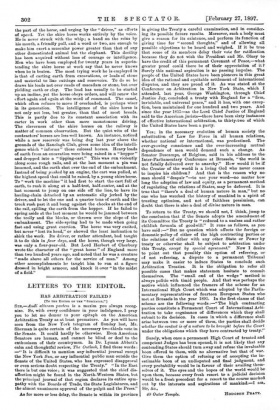LETTERS TO THE EDITOR.
HAS ARBITRATION FAILED ?
[TO THE EDTTOR OF THE "SPECTATOR.'.]
SIn, Judi alteram partem is a maxim you always recog- nise. So, with every confidence in your indulgence, I pray you to let me demur to your epitaph on the American Arbitration Treaty as at least premature. As you will have seen from the New York telegram of Sunday last, Mr. Sherman is quite certain of the necessary two-thirds vote in the Senate. It could hardly be otherwise. Even American Senators are human, and cannot be blind or deaf to the enthusiasm of their countrymen. In Dr. Lyman Abbott's calm and thoughtful review, The Outlook, I find these words : —" It is difficult to mention any influential journal except the New York Sun, or any influential public man outside the Senate of the United States, who has expressed disapproval or even serious doubt respecting the Treaty." " In the East there is but one voice ; it was suggested that the chief dis- affection might be found in the North-Western States, but the principal journal of that region declares its entire sym- pathy with the Boards of Trade, the State Legislatures, and the almost unanimous approval of the pulpit and the Press."
As for more or less delay, the Senate is within its province
in giving the Treaty a careful examination, and in consider- ing its possible future results. Moreover, such a body must give a reason for its existence, and perform its function of giving time for " second thoughts," and of allowing all possible objections to be heard and weighed. If it be true that some of its members delay their vote for ratification because they do not wish the President and Mr. Olney to have the credit of this permanent Covenant of Peace,—what greater proof could there be of their appreciation of it P Surely this national aspiration is no passing impulse. The people of the United States have been pioneers in this great idea of the rational and equitable settlement of international disputes, and they are proud of it. As was stated at the Conference on Arbitration in New York State, which I attended, last year, George Washington, through Chief Justice Jay, concluded a treaty with England for a "firm, inviolable, and universal peace," and it has, with one excep- tion, been maintained for one hundred and two years. And since the year 1815—as the Lord Chief Justice of England said to the American jurists—there have been sixty instances of effective international arbitration, to thirty-two of which the United States have been a party.
Yes ; in the necessary evolution of human society the substitution of Law for Force in all human relations, whether national or international, was predestined. The ever-growing conscience and the ever-increasing mutual dependence of men would demand such a change. As Senator Descamps, of Belgium, said in his address to the Inter-Parliamentary Conference at Brussels, " the world is, not fatally delivered over to anarchy." How would it be if the Creator of the world is a living God who never ceases to inspire his children ? And that is the reason why no• man should "despair "—to use your word—no matter how long the adoption of law and equity, as a permanent method of regulating the relations of States, may be deferred. It is true that " there's a deal of human nature in man," but n- one who has watched the history of mankind in a spirit of trusting optimism, and not of faithless pessimism, can doubt that there is also a deal of divine nature in man.
To return to the Treaty, we should not, I think, jump to the conclusion that if the Senate adopts the amendment of its Committee the Treaty is "reduced to a useless and rather childish formula of goodwill." It runs as follows, as you• have said :—" But no question which affects the foreign or domestic policy of either of the high contracting parties or the relations of either with any other State or Power by treaty or otherwise shall be subject to arbitration under this Treaty, except by special agreement." Now I desire to point out that possibly this option of referring, or of not referring, a dispute to a permanent Tribunal may make it easier to induce States to conclude such Arbitration Treaties. It is the obligation to refer all possible cases that makes statesmen hesitate to commit themselves. The " small end of the wedge " method always politic with timid people. And that was perhaps the motive which influenced the framers of the scheme for an International High Court which was adopted by the Parlia- mentary representatives of fourteen European States who met at Brussels in the year 1895. In the first clause of that scheme are the following words :—" The high contracting parties constitute a Permanent Court of International Arbi- tration to take cognisance of differences which they shall submit to its decision. In cases in which a difference shall arise between two or more of them, the parties shall decide whether the contest is of a nature to be brought before the Court under the obligations which they have contracted by treaty."
Surely, when once a permanent High Court of trusted and competent Judges has been opened, it is not likely that any contending States should turn away and refuse the invaluable boon offered to them, with no alternative but that of war. Give them the option of refusing or of accepting the in- estimable boon of an undisputed and final judgment, and every probability would be in favour of their availing them- selves of it. The eyes and the hopes of the world would be upon them, because every fresh resort to a judicial decision would be a fresh precedent for a resort to the course marked out by the interests and aspirations of mankind.—I am, Sir, &c.,


































 Previous page
Previous page